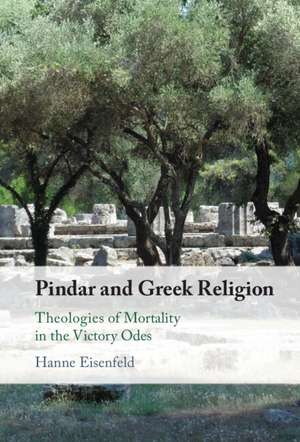Modern Jewish Philosophy and the Politics of Divine Violence
Autor Daniel H. Weissen Limba Engleză Hardback – 5 apr 2023
Preț: 588.36 lei
Preț vechi: 661.07 lei
-11% Nou
Puncte Express: 883
Preț estimativ în valută:
112.58€ • 117.54$ • 93.18£
112.58€ • 117.54$ • 93.18£
Carte tipărită la comandă
Livrare economică 05-19 aprilie
Preluare comenzi: 021 569.72.76
Specificații
ISBN-13: 9781009221658
ISBN-10: 1009221655
Pagini: 350
Dimensiuni: 158 x 236 x 26 mm
Greutate: 0.68 kg
Editura: Cambridge University Press
Colecția Cambridge University Press
Locul publicării:New York, United States
ISBN-10: 1009221655
Pagini: 350
Dimensiuni: 158 x 236 x 26 mm
Greutate: 0.68 kg
Editura: Cambridge University Press
Colecția Cambridge University Press
Locul publicării:New York, United States
Cuprins
Introduction; 1. Moses Mendelssohn and the rabbinic suspending of coercive punishment; 2. Who can command violence, and who should obey? Mendelssohn on divine sovereignty and the limits of modern Jewish integration; 3. Jewishness and the prophetic anarchism of Hermann Cohen; 4. Franz Rosenzweig and the Jewish alternative to militarism; 5. Walter Benjamin and the antinomianism of classical rabbinic Judaism; Conclusion: no other gods, no other masters.
Recenzii
'Bridging modern Jewish philosophy and classical rabbinic sources, Daniel Weiss argues that a commitment to divine sovereignty does not produce but rather mitigates human violence. Weiss offers new and compelling readings of a number of seminal modern Jewish philosophers, while also setting forth a provocatively fruitful vision of modern Jewish philosophy as not merely the product of modern Europe but rather as the rightful inheritor of classical Jewish thought. Anyone interested in Judaism, modern philosophy and indeed the relationship between religion and politics will have much to gain from this timely and important book.' Leora Batnitzky, Princeton University
'Weiss shows the urgent relevance of both the classical rabbinic tradition and modern Jewish philosophy by reading each in light of the other – with unexpected results that challenge our understanding of human and of divine violence. What begins as a close study of surprising continuities within Judaism becomes a forceful critique of the Western philosophical tradition and its insufficient regard for the living individual.' Holger Zellentin, University of Tübingen
'Daniel Weiss has written a highly original consideration of the relationships between modern German-Jewish thought, classical rabbinic thought, and some of the core questions of political violence. Every thinker considered appears in a new light: Mendelssohn and Cohen are no longer so staid and bourgeois, Rosenzweig no longer so otherworldly, Benjamin no longer so disconnected from rabbinics. Instead, all four appear as rabbinic-anarchic critics of sovereign violence, articulators of an alternative mode of reason that challenges philosophy and political theology alike.' Samuel Hayim Brody, author of Martin Buber's Theopolitics
'With refreshingly careful treatment of Moses Mendelssohn, Hermann Cohen, Franz Rosenzweig, and Walter Benjamin, Weiss shows how their Jewish theopolitical thought is informed by rabbinic Judaism. Along the way he demonstrates that they have been poorly understood by their Christian and other mainstream critics, who in turn have subjected their thought to the terms of dominant discourses and imaginaries. Weiss thus walks the reader through a rich and inspiring landscape of these Jewish critical engagements with the structures of the modern state and its corresponding violence. Christian political theologians and others will find in Modern Jewish Philosophy and the Politics of Divine Violence a badly needed window for understanding early Christian theopolitics, which, considered without such Jewish sensibilities, have been systematically domesticated to authorize and fuel the violence of the modern state. I expect that the book will be for others what it has been for me, a gift for the imagination of a messianic politics.' Tommy Givens, Fuller Theological Seminary
'Weiss shows the urgent relevance of both the classical rabbinic tradition and modern Jewish philosophy by reading each in light of the other – with unexpected results that challenge our understanding of human and of divine violence. What begins as a close study of surprising continuities within Judaism becomes a forceful critique of the Western philosophical tradition and its insufficient regard for the living individual.' Holger Zellentin, University of Tübingen
'Daniel Weiss has written a highly original consideration of the relationships between modern German-Jewish thought, classical rabbinic thought, and some of the core questions of political violence. Every thinker considered appears in a new light: Mendelssohn and Cohen are no longer so staid and bourgeois, Rosenzweig no longer so otherworldly, Benjamin no longer so disconnected from rabbinics. Instead, all four appear as rabbinic-anarchic critics of sovereign violence, articulators of an alternative mode of reason that challenges philosophy and political theology alike.' Samuel Hayim Brody, author of Martin Buber's Theopolitics
'With refreshingly careful treatment of Moses Mendelssohn, Hermann Cohen, Franz Rosenzweig, and Walter Benjamin, Weiss shows how their Jewish theopolitical thought is informed by rabbinic Judaism. Along the way he demonstrates that they have been poorly understood by their Christian and other mainstream critics, who in turn have subjected their thought to the terms of dominant discourses and imaginaries. Weiss thus walks the reader through a rich and inspiring landscape of these Jewish critical engagements with the structures of the modern state and its corresponding violence. Christian political theologians and others will find in Modern Jewish Philosophy and the Politics of Divine Violence a badly needed window for understanding early Christian theopolitics, which, considered without such Jewish sensibilities, have been systematically domesticated to authorize and fuel the violence of the modern state. I expect that the book will be for others what it has been for me, a gift for the imagination of a messianic politics.' Tommy Givens, Fuller Theological Seminary
Notă biografică
Descriere
Uncovers connections between modern Jewish philosophers and classical rabbinic thought, arguing for rethinking of Judaism, politics, and violence.
